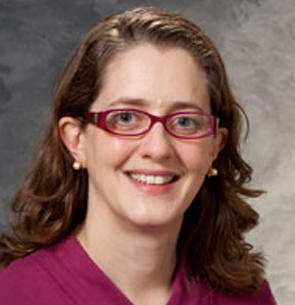Physicians in action: Dr. Karin Zuegge
Lifetime awareness of waste guides anesthesiologist’s career path
Dr. Karin Zuegge’s awareness of waste began as a child. The University of Wisconsin Health anesthesiologist recalls her mother saying “there is a huge future in trash – it is always being produced.”
As a family they composted and recycled but didn’t have trash pick up so they drove their waste to the landfill themselves. This early concern about waste generation and disposal sparked a lifelong penchant for always being on the lookout for opportunities to reduce waste.
During her anesthesiology residency, she became increasingly concerned about the waste generated in hospitals, especially in the operating room.
“Working in the OR, you see an enormous amount of sterile packaging get discarded every day,” she says. “I couldn’t stop looking at it and thinking about how this waste accumulates and all just goes to the landfill.”
Zuegge soon discovered the OR is one of the largest users of supplies in hospitals. (Studies have estimated 20 to 30 percent of a hospital’s total waste comes from the OR.) Early in her career, she also learned about another type of waste generated from the OR: waste anesthetic gases.
“I was talking about low-flow anesthesia with one of my residents and he referenced a research paper about the greenhouse gas potential of anesthetic gases,” Zuegge recalls. “I then did my own research about the environmental impact of inhaled anesthetic gases and became committed to reducing their use in my practice and educating my anesthesia colleagues about alternative agents.”
Recognizing that physicians can be powerful advocates for sustainable health care, Zuegge decided to write a proposal to her hospital CEO, articulating the business case for creating a medical director of sustainability position.
In her proposal she wrote, “Physicians are the final arbiters of health care. It is in their professional nature to challenge the establishment to promote patient welfare. Medical decision making is driven by data and clinical reasoning based on physician expertise. The endorsement of a physician for sustainability will lend immense credibility to this program for frontline clinicians within the organization and beyond. An official title and position also lends authority and influence to the person in this role. Having a physician leader will make it clear that the direction of the program is in the best interests of patient care and health care overall.”
She closed the letter by saying, “Physician representation in leadership can improve the sustainability program impact on the whole organization. Executive leaders have many responsibilities and can have a larger influence on the organization with dedicated, enthusiastic, frontline support. A great way to provide this would be to have an official medical director of sustainability.”
Hospital leadership agreed, and Zuegge became the health system’s first medical director of sustainability in January 2017. In that role, Zuegge partners with the sustainability program director and engages clinicians in the organization’s sustainability efforts. But she is most proud of her successes in the operating room.
“We initiated a recycling program in the OR and now divert 20 percent of our previous landfill tonnage to be recycled,” she says. “We educated providers about the environmental and cost impacts of anesthetic gases. Using fresh gas flow and agent choice initiatives, we have seen an over $30,000 per month reduction in purchasing and a more than 4 million kilogram annual reduction in CO2 emissions as a result of this.”
As the vice chair for education for the Department of Anesthesiology, Zuegge has the opportunity to educate her colleagues about sustainable health care. She has established an annual Grand Rounds lecture on a sustainability topic as well as an annual new employee and new resident orientation about their sustainability initiatives.
Zuegge engages and educates clinicians using creative methods, such as promoting sustainable practices through art. To raise awareness about waste, their green team launched a project to start collecting colorful, plastic, medication vial tops. Zuegge then collaborated with the art coordinator for UW Health and held employee events to create mosaic artwork from the vial caps. Zuegge wrote about the success of this project in the journal Anesthesiology.
In her role as a sustainability professional Zuegge believes every action taken to reduce the impact of health care, no matter how small, is valuable. She communicates this to her colleagues by reminding them, “every step we take is important and matters in the path towards a more sustainable future.”
Zuegge was an inaugural member of the Health Care Without Harm Physician Network, sits on the American Society of Anesthesiologists Environmental Task Force, and serves as the liaison between the task force and Practice Greenhealth’s Greening the OR initiative.

